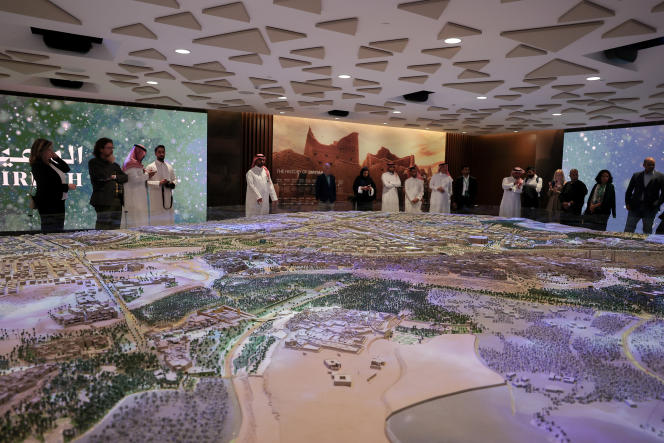The decor of the palaces of Al-Turaif, with their high sand-colored openwork walls, typical of the architecture of Najd, has become a must on the outskirts of Riyadh for Saudi families and foreign visitors. After a photo break overlooking Wadi Hanifa, tourists rush into the narrow streets of the historic city of Diriya, listed as a UNESCO World Heritage Site, to immerse themselves in the history of the Al Saud dynasty since the founding , in the XVIIIe century, of its first emirate.
The site, reopened to the public at the end of 2022, not only serves as a showcase for the kingdom’s tourism promotion campaign, launched by the Crown Prince, Mohammed Ben Salman, known as “MBS”, as part of Vision 2030, his vast program of reforms. It is the cornerstone of the national novel that “MBS” is trying to write, around the Saud family alone, in the extension of the work begun some thirty years ago by his father, King Salman, an 87-year-old sovereign with a passion for history.
In this new story, the royal dynasty emancipates itself from the tutelary figure of Sheikh Mohammed Ben Abdelwahhab, the Muslim theologian with whom the Emir of Diriya, Mohammed Ben Saud, had sealed the so-called alliance “of the saber and the chahada”. (the Muslim profession of faith), in 1744, to conquer the Arabian Peninsula. Apart from a manuscript he wrote, Sheikh Abdelwahhab does not appear anywhere in Diriya. His silhouette is only drawn in shadow, alongside that of the emir, in a museum video.
For generations, historians and writers have told Saudi schoolchildren that the pact between the two men was the founding event of the first state. By a decree signed by his hand, on February 22, 2022, King Salman invalidated this narrative and relegated Wahhabism to a secondary role in the history of the kingdom. The sovereign placed the creation of the state seventeen years earlier, in 1727, the year of the accession to the throne of the Emir of Diriya, and invited the Saudi nation to celebrate the “Day of the foundation” on the 22 FEBRUARY.
“Exclusive hypernationalism”
“Under King Salman, we move from the state to the nation. It centralizes this great anarchic country around Riyadh and “de-Wahhabizes” to build the nation, because Salafism is anti-national”says historian and diplomat Louis Blin, former French consul in Jeddah.
This distancing of Wahhabism is at the heart of Vision 2030, the modernization plan drawn up by his son, the strongman of the kingdom. The abolition of the religious police, the emancipation of women, the opening of the country to entertainment and tourism and the reappropriation of the pre-Islamic heritage are the visible face of this transformation, intended to extract society from the clutches of this doctrine. ultra-rigorous Islamic.
You have 71.57% of this article left to read. The following is for subscribers only.
